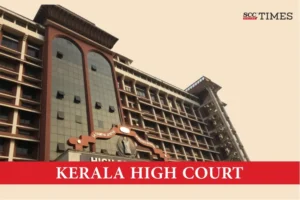Kerala High Court: In a matter concerning the cancellation of marriage registration as the marriage was not somenised under any personal or special law, the Single Judge Bench of CS Dias, J. held that a Registrar of Marriages cannot cancel a marriage certificate unless it is proved that the registration was either fraudulent or improperly made.
Background
The petitioners had lived together briefly in November 2014. To avoid legal repercussions and social complications, they had their marriage registered under the Kerala Registration of Marriages (Common) Rules, 2008 (‘the Rules’) as evidenced by the certificate of marriage. However, soon thereafter, their relationship deteriorated, and they had been living separately for the past ten years. Petitioner 1 was a Muslim and the petitioner 2 was a Hindu. As their marriage had not been solemnised under the Special Marriage Act, 1954, it did not constitute a valid marriage in the eyes of the law. Nonetheless, the registration gave a misleading impression that they were legally married. Consequently, the petitioners submitted a joint application before the Local Registrar of Marriages seeking cancellation of the marriage certificate. However, the Local Registrar, rejected the request, stating that there was no provision for such a cancellation. The petitioners contended that Rule 13 of the Rules empowered the Local Registrar to cancel the certificate and that the impugned order was passed without due consideration of this provision, rendering the said communication unjustifiable.
The Registrar General of Marriages in a statement asserted that the marriage had been registered in accordance with the Rules. The Local Registrar had registered the marriage based on memorandum, declaration issued by a member of the Local Self Government Institution (‘LSGI’), and other supporting documents confirming that the marriage had been solemnised on 19-10-2014 at the residence of the petitioner 2. The statements of the petitioners and their witnesses had corroborated the documents submitted. The petitioners had not produced any material to demonstrate that the marriage was fraudulently or improperly registered, which was a necessary requirement under Rule 13 for cancellation. Therefore, the respondents maintained that there was no illegality in the issuance of the communication.
Analysis and Decision
The Court referred to Kerala Registration of Marriages (Common) Rules, 2008, which indicated that the Registrar is empowered to cancel an entry in the Register, if the entry is erroneous in form or substance or has been fraudulently or improperly entered.
The Court highlighted that the enquiry envisaged under Rule 11 was summary in nature. It observed that the Registrar was not empowered to conduct a comprehensive enquiry into the validity of the marriage or the competence of the parties to marry at the time of considering the memorandum. If the Registrar was objectively satisfied that the marriage had been solemnised, he was empowered to proceed with the registration of the marriage.
The Court noted that, in the present case, the petitioners had, of their own free will and volition, submitted a memorandum along with a supporting letter from a member of the LSGI, affirming that their marriage had been solemnised on 19-10-2014 and requesting its registration. During the enquiry conducted by the Local Registrar, both the petitioners and their witnesses had unequivocally deposed that the marriage was solemnised according to customary rites at the residence of the petitioner 2. Based on the documentary evidence and the oral testimonies, the Local Registrar had registered the marriage.
The Court held that having voluntarily produced the documents and testified to the solemnisation of the marriage, the petitioners were estopped from later contending that no valid marriage existed. The Court observed that the Registrar did not have the jurisdiction under Rule 13 to adjudicate such disputed questions of fact.
It further held that questions regarding the validity of the marriage and the marital status of the parties were matters to be decided by a competent civil court.
Upon careful consideration of the facts and circumstances, the Court found no arbitrariness or illegality in the impugned order. It concluded that the writ petition was devoid of merit and was, therefore, liable to be dismissed.
However, the Court clarified that the judgment would not prejudice the petitioners’ right to approach a court of competent jurisdiction for a declaration regarding their marital status.
Accordingly, the writ petition was dismissed.
[Hussain v. State of Kerala, 2025 SCC OnLine Ker 3811, decided on 10-06-2025]
Advocates who appeared in this case:
For Petitioners: BY ADVS. SRI.CIBI THOMAS SMT.SWARNA THOMAS SMT.ANUSREE K.
For Respondents: ADV SRI.R.SURENDRAN, SR.GP.SMT.VIDYA KURIAKOSE

